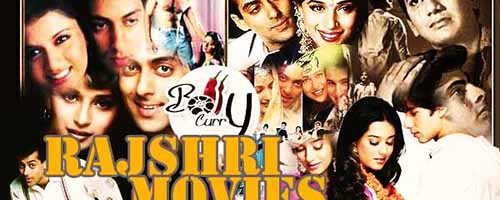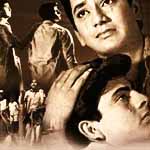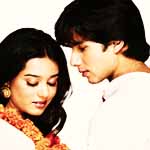- Home
- News
- Talk Round' Town
- Iconic Rajshri movies
Iconic Rajshri movies
 Comments [ 10 ] By Gurprit K. | 28 July 2014 | 11:37pm
Comments [ 10 ] By Gurprit K. | 28 July 2014 | 11:37pm

Rajshri productions is a quintessential Bollywood production house, which has brought numerous movies to the silver screen that have mass appeal. What sets the Rajshri movies apart is the central theme that their films are based on - the familial bonds that push or pull the characters towards or away from each other.
Some of the iconic films from this production house such as Dosti (1964), Maine Pyar Kiya (1989), Hum Aapke Hain Kaun (1994), Hum Saath-Saath Hain (1999) and Vivah (2006) revolve around this plot-twist. The first two movies had an emphasis on friendship, the next two dealt with traditional joint families and the last one focused on romance, with the underlying theme of familial ties and discord remaining the same.
 Dosti had friendship at the
forefront, with the friendship between a blind man and a physically
challenged man being the central plot. It also featured a strained
relationship between one of the male leads, the blind singer, and his
sister, with the latter disowning him due to the differences in their
financial status. The situations that the characters undergo tests the
strengths of their relationships and at the end, the depth of their
bonds withstand these tests and the movie culminates with the characters
reconciling.
Dosti had friendship at the
forefront, with the friendship between a blind man and a physically
challenged man being the central plot. It also featured a strained
relationship between one of the male leads, the blind singer, and his
sister, with the latter disowning him due to the differences in their
financial status. The situations that the characters undergo tests the
strengths of their relationships and at the end, the depth of their
bonds withstand these tests and the movie culminates with the characters
reconciling. Just like Dosti, Maine Pyar Kiya also had
friendship at the heart of its plot. It narrated the story of two
friendships - the no-longer-close-friends Karan and Kishan, played by
Alok Nath and Rajeev Verma, and the innocent friendship between Prem
(Salman Khan) and Suman (Bhagyashree), which later blossoms into true
love. As in Dosti, the difference in financial status becomes the villain in Maine Pyar Kiya as well, and causes the friendship between Prem and Suman's fathers to fall apart.
Just like Dosti, Maine Pyar Kiya also had
friendship at the heart of its plot. It narrated the story of two
friendships - the no-longer-close-friends Karan and Kishan, played by
Alok Nath and Rajeev Verma, and the innocent friendship between Prem
(Salman Khan) and Suman (Bhagyashree), which later blossoms into true
love. As in Dosti, the difference in financial status becomes the villain in Maine Pyar Kiya as well, and causes the friendship between Prem and Suman's fathers to fall apart. Though
these 2 movies are separated by a gap of over two decades, the lengths
to which a character is ready to go for the sake of his/her friend, who
was as close as a family member, was shown with the same level of
intensity.
 The blockbuster Rajshri movie from the 90's Hum Aapke Hain Koun (1994)
portrayed the lighter and happier side of living in a traditional joint
family. The movie put across the message that occasions of happiness
are only increased by the presence of extended family members and that
shoulders to lean onto during sad times were aplenty. The selfless and
sacrificial trait found in many of Rajshri characters was at the heart
of this story too. In Hum Aapke Hain Koun, it was Nisha (Madhuri
Dixit Nene) and Prem (Salman Khan) who were ready to let go of their love for
the sake of Rajesh (Mohnish Behl) and his infant son. An equally
reciprocating decision by Rajesh gave the movie a happy ending, with the
two lovers reunited.
The blockbuster Rajshri movie from the 90's Hum Aapke Hain Koun (1994)
portrayed the lighter and happier side of living in a traditional joint
family. The movie put across the message that occasions of happiness
are only increased by the presence of extended family members and that
shoulders to lean onto during sad times were aplenty. The selfless and
sacrificial trait found in many of Rajshri characters was at the heart
of this story too. In Hum Aapke Hain Koun, it was Nisha (Madhuri
Dixit Nene) and Prem (Salman Khan) who were ready to let go of their love for
the sake of Rajesh (Mohnish Behl) and his infant son. An equally
reciprocating decision by Rajesh gave the movie a happy ending, with the
two lovers reunited. Another of Rajshri's movies from the 90's, Hum Saath Saath Hain dealt
with the darker side of being part of a joint family, where a small
fissure in the wall was enough to pull down the entire structure,
affecting one and all involved. Like most of Rajshri's movies in the
90s, Hum Saath Saath Hain too had the characters of Prem (Salman
Khan) and Vivek (Mohnish Behl) perform selfless acts for the sake of
their family members. The relationships that had turned bitter due to
actions of the matriarch of the family Mamta, played by Reema Lagoo,
were shown to be on the mend in the climax.
Another of Rajshri's movies from the 90's, Hum Saath Saath Hain dealt
with the darker side of being part of a joint family, where a small
fissure in the wall was enough to pull down the entire structure,
affecting one and all involved. Like most of Rajshri's movies in the
90s, Hum Saath Saath Hain too had the characters of Prem (Salman
Khan) and Vivek (Mohnish Behl) perform selfless acts for the sake of
their family members. The relationships that had turned bitter due to
actions of the matriarch of the family Mamta, played by Reema Lagoo,
were shown to be on the mend in the climax. Vivah (2006)
followed the same plot line as well and featured a sour relationship -
one which was not between the leads, but between the character Poonam
(Amrita Rao) and her aunt Rama (Seema Biswas). The bond that Poonam
continued to nurture in her heart towards her foster family is what led
her to risk herself to save her cousin sister, even though she was
ill-treated by her aunt throughout her life. The movie's climax featured
an emotional reunion between the two females, with the heroic and
self-sacrificing act by the soon-to-be-bride Poonam being the catalyst.
Vivah (2006)
followed the same plot line as well and featured a sour relationship -
one which was not between the leads, but between the character Poonam
(Amrita Rao) and her aunt Rama (Seema Biswas). The bond that Poonam
continued to nurture in her heart towards her foster family is what led
her to risk herself to save her cousin sister, even though she was
ill-treated by her aunt throughout her life. The movie's climax featured
an emotional reunion between the two females, with the heroic and
self-sacrificing act by the soon-to-be-bride Poonam being the catalyst.The
single plot thread that best summarizes a huge portion of the Rajshri
filmography would be conflicts arising amongst the key characters,
usually family members, followed by emotional distancing, and finally
culminating in happy reconciliation. The commercial success and the
critical acclaim that these movies have achieved are proof enough that
Rajshri productions captures the essence of Indian families like no
other. The emotions, the bonds and the characters portrayed are accepted
by audiences all over, because the underlying theme - that of
unconditional love between those in a family, is universal.
Author: Aishwarya S.
Editor/s: Ritchelle C. and Gunia M.
Graphics: Komal P.
Editor/s: Ritchelle C. and Gunia M.
Graphics: Komal P.
Do you have a suggestion or comment for BollyCurry? Drop us a PM at BC_Dropbox today.
Copyright BollyCurry
User Rating  (28 Votes)
(28 Votes)
Views 6594
User Comments

If You are a member of India-forums, Then You can also log in here.
Related Videos
- Nawazuddin Siddiqui And ...
- Thackeray’s Public Review ...
- Nawazuddin Gives a CLASSY ...
- Sreesanth Walks Out | ...
- Anoop Jalota Sent To The ...
- Bigg Boss 12’s First 4 ...
Highlights Zone
- Many star kids set to twinkle on big screen this year
- Salman's Bharat Trailer RAKES praises from all-over Bollywood!
- Salman Khan to be a part of Tere Naam sequel? Satish Kaushik REVEALS
- Itna bhaari gyaan dene ki zarurat nahi hai; Bharat Trailer TROLLED!
- Satish Kaushik locks script of 'Tere Naam' sequel
- Ali Bhatt REACTS to Kalank's POOR Box Office Business
- Trailer Review: Bharat
- SRK praises Salman's 'Bharat' trailer
- When Nawazuddin- Amrita MET COINCIDENTALLY!
- Disha Patani looks STEAMING HOT in Bharat's trailer!











